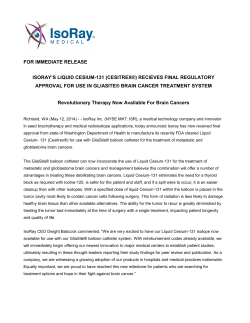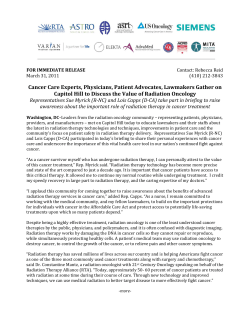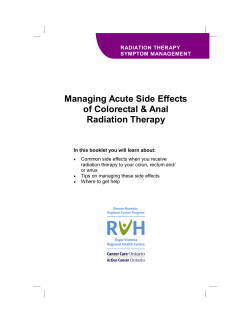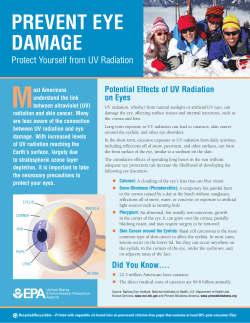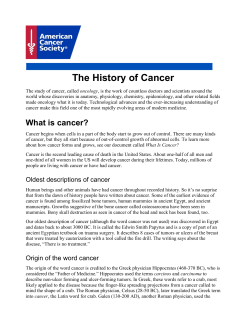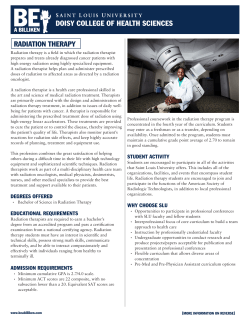
CANCERS OF THE COLON, RECTUM AND ANUS RADIATION THERAPY FOR
RADIATION THERAPY FOR CANCERS OF THE COLON, RECTUM AND ANUS Facts to Help Patients Make an Informed Decision TARGETING CANCER CARE AMERICAN SOCIETY FOR RADIATION ONCOLOGY FACTS ABOUT COLON, RECTUM AND ANUS CANCERS In 2012 it is estimated that 103,170 Americans will be diagnosed with colon cancer. Colorectal cancer is the third most commonly diagnosed cancer in men and women. Of those, 40,290 will be diagnosed with rectal cancer. About 6,230 people will learn they have anal cancer. Patients with these types of cancer often benefit from radiation therapy as part of treatment. Some cancers involving the bowel run within families (hereditary colorectal cancers). It is important to discuss your diagnosis with family members so they can decide with their doctors whether they need to be screened for colorectal cancers. This is especially important if you were diagnosed with a colorectal cancer at a young age or if there are several other types of cancers that run in your family TREATING COLON, RECTUM AND ANUS CANCERS Radiation Therapy Radiation therapy is often used in conjunction with surgery and chemotherapy to treat cancers of the colon, rectum and anus. Treatment involves focused radiation to the bowel and pelvis to treat cancer cells in the area. Surrounding healthy tissue can be affected, but normal cells are often better able to heal from radiation injury, compared to cancer cells, because they have maintained the ability to repair radiation induced damage. For colon cancer, depending on the location and stage of your cancer, radiation can lower the chance of recurrence. For some rectal cancers, radiation therapy is given with chemotherapy to make the tumor smaller so it can be removed more easily during surgery. In some cases, radiation can allow an organ-sparing surgery to be possible. It is also common for radiation and chemotherapy to be given before surgery for rectal cancer. Anal cancer can often be treated with radiation therapy and chemotherapy, as an organ-preserving approach that avoids the need for surgery. Surgery Surgery often plays a key role in treatment. For colorectal cancers, it is the main curative treatment. The surgeon will determine how much of the large bowel needs to be removed, but often it involves removal of a section of the colon. Because the tumor can spread to lymph nodes nearby, often some lymph nodes are removed at the time of surgery. Depending upon the location of the tumor, surgery may or may not allow normal bowel function afterwards. For anal cancers, surgery is less frequently used at the time of diagnosis because effective organ-preserving approaches are available. If bowel function is poor, sometimes surgery is used at first, but often it is reserved as a second chance for cure where organ-preserving treatment does not succeed. Because surgery for the anal canal involves removing the area responsible for how you go to the bathroom, a surgery called a colostomy to re-route bowel movements is usually necessary as well. Medical Therapy While surgery and radiation focus directly on treating the bowel or pelvic area, medication is often recommended to improve cure rates. A medical oncologist will evaluate you and determine what medications may be most helpful. Chemotherapy is a kind of medication that can destroy cancer cells by different methods. Often, two or more drugs may be combined for the best results. The dose and schedule for treatment varies, as some chemotherapy may be every few weeks and in some cases it’s given daily. It also differs depending upon the whether it’s colon or anal cancer. For more details about these drugs, ask your medical oncologist what may be best for you. EXTERNAL BEAM RADIATION THERAPY External beam radiation therapy involves a series of daily outpatient treatments that accurately deliver radiation to the area needing therapy. The radiation beam usually comes from a machine called a linear accelerator. Before beginning treatment, you will be scheduled for a simulation to map out the area to be treated. This will involve having X-rays and/or a CT scan. Landmarks placed on your skin (often tiny tattoos) allow the radiation therapists delivering your treatments to precisely position you each day. To minimize side effects, the treatments are usually over about five or six weeks, five days a week (Monday through Friday). This allows your doctors to get enough radiation into your body to kill the tumor cells while giving healthy cells time to recover each day. Technical terms that may be mentioned for colorectal and anal cancer treatments include three dimensional conformal radiation therapy (3-D CRT) and intensity modulated radiation therapy (IMRT). Your radiation oncologist can provide more information about these different techniques. POSSIBLE SIDE EFFECTS Radiation therapy to the abdomen and pelvis may cause more frequent bowel movements, occasionally with diarrhea, abdominal cramping or rectal discomfort. It may also cause more frequent urination, sometimes with a burning feeling or cause a small amount of blood to appear in the urine or stool. These should resolve after treatment ends. Some patients may also feel tired or lose their appetite. This is temporary as well. Possible skin irritation problems depend on your tumor and the areas needing treatment. For anal cancer patients, a pronounced but temporary skin irritation is usually the major side effect from the treatment. It is possible that your treatment may need to be put on hold if the skin reaction is severe. Talk with your doctor and treatment team (including the nurse and radiation therapist operating the radiation machine) about any new symptoms you experience during treatment. Side effects that occur are not the same for all patients. Ask your doctor what you might expect from your specific treatment program. It is likely you will receive chemotherapy in addition to radiation therapy. The side effects from the chemotherapy will depend on the drugs being prescribed and how often you are to receive them. Ask your medical oncologist about chemotherapy side effects you may experience. Side effects often can be controlled with medications or changes in your diet. Tell your doctor or nurse if you experience any of them, so they can work to help you feel better. CARING FOR YOURSELF DURING TREATMENT It is important to care for yourself as well as possible during radiation therapy because the normal parts of your body that are near the tumor are also receiving some radiation, although not as much as the cancer. These normal parts of your body need time and support to heal. A balanced diet, mild amount of physical activity and taking time to rest are all important parts of your cancer treatment. Follow your doctor’s orders and, if you are unsure of anything, ask your nurse or doctor any question you may have about treatment. Be sure to tell your radiation oncologist about any vitamins or dietary supplements that you are currently taking to make sure they are safe to take during radiation therapy. During and even after radiation therapy is over, you will need to take special care of your skin. Stay out of the sun, avoid hot or cold packs, and do not use lotions or ointments without checking with your doctor or nurse first. You should also be sure to clean the skin over the areas receiving radiation therapy with warm water and mild soap. Completing treatment and recovery can be challenging. Seek out help from support groups and friends ahead of time. If you have a support network in place before and during treatment, it will be easier to get through side effects since people you can count on will be around to help you. If you need additional support, let your doctor and nurse know. LEARNING ABOUT CLINICAL TRIALS The radiation oncology team is constantly exploring new ways to treat colon, rectal and anal cancers through studies called clinical trials. Today’s treatment standards are the result of earlier clinical trials proving that radiation therapy kills cancer cells and is safe in the long-term. For more information on current clinical trials, please visit: National Cancer Institute www.cancer.gov/clinicaltrials Radiation Therapy Answers www.rtanswers.org Radiation Therapy Oncology Group www.rtog.org Clinical Trials.gov www.clinicaltrials.gov HELPFUL WEB SITES ON COLORECTAL CANCER National Cancer Institute www.cancer.gov Radiation Therapy (RT) Answers www.RTanswers.org Cancer.Net www.cancer.net Colorectal Cancer Alliance www.ccalliance.org Colorectal Cancer Coalition www.fightcolorectalcancer.org ABOUT THE RADIATION ONCOLOGY TEAM Radiation oncologists are the doctors who oversee the care of each person undergoing radiation treatment. Other members of the treatment team include radiation therapists, radiation oncology nurses, medical physicists, dosimetrists, social workers and nutritionists. For information on what each of these professionals does or to locate a radiation oncologist near you, visit www.rtanswers.org. ABOUT ASTRO The American Society for Radiation Oncology is the largest radiation oncology society in the world with more than 10,000 members who specialize in treating cancer with radiation therapies. ASTRO is dedicated to improving patient care through education, clinical practice, advancement of science and advocacy. Visit www.astro.org for more information. CARING FOR YOURSELF NOTES/QUESTIONS FOR YOUR DOCTOR AMERICAN SOCIETY FOR RADIATION ONCOLOGY 8280 Willow Oaks Corporate Drive, Suite 500 Fairfax, VA 22031 Phone: 1-800-962-7876 • 703-502-1550 Fax: 703-502-7852 www.astro.org www.rtanswers.org © ASTRO 2012 Printed on recycled paper.
© Copyright 2025
